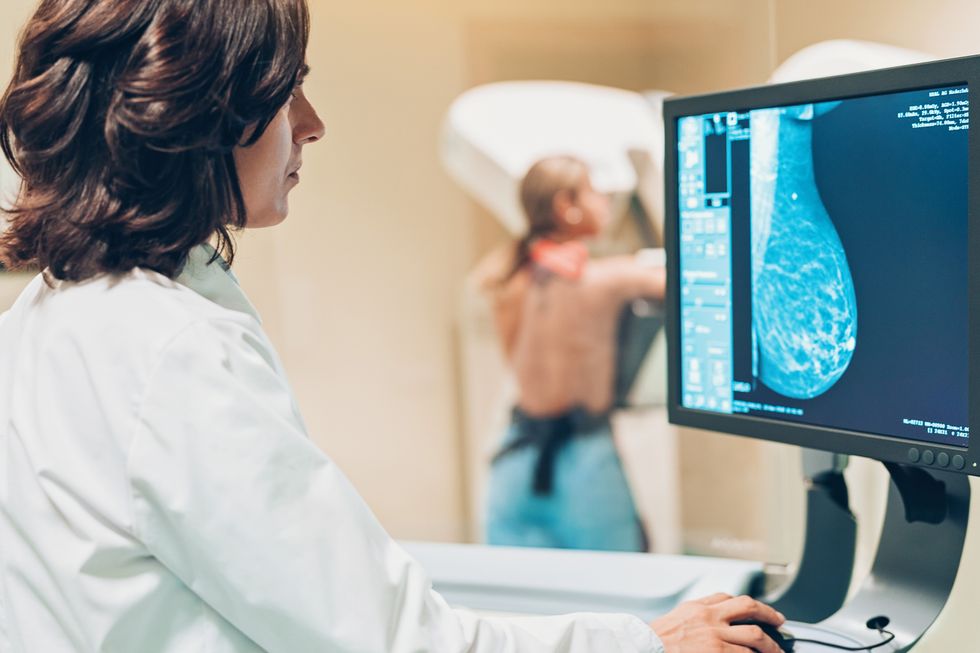The NHS is facing difficult questions as King Charles undergoes his treatment for an unspecified form of cancer.
Buckingham Palace has not specified whether the king is receiving private healthcare or being treated on the National Health Service but rest assured Britons up and down the country are getting a raw deal.
The proportion of patients in England waiting less than 62 days from an urgent suspected cancer referral, urgent screening, or consultant update to their first definitive treatment for cancer is 65.9 percent according to NHS England figures released today. The target is 85 percent.
Speaking exclusively to GB News, health experts claim that this is just the tip of the iceberg and that systemic problems are impacting every stage of the cancer care pathway.
Waiting times are falling far short of targets, new NHS data shows
Getty Images
“In my experience there are delays with accessing diagnostic tests, such as biopsies and scans. Insufficient numbers of radiologists and pathologists often mean delays in getting biopsy and imaging results,” said Dr Kassam, cancer prevention and lymphoma specialist.
She continued: “Once a diagnosis of cancer is made, there are often delays in getting onto a theatre list for surgery and for getting a slot in chemotherapy units to start treatment. In addition, if an inpatient admission is needed beds are never available immediately given that most hospitals are currently over capacity.”
It’s a view widely shared among those working in the cancer space. “Long waiting times for diagnostic tests, specialist appointments, and treatments can delay timely intervention, affecting patient outcomes,” lamented Malcolm Packer, Chief Executive Officer of Kidney Cancer UK.
Indeed, a new survey report released by Kidney Cancer UK has found that almost one in four (23 percent) kidney cancer patients are being initially misdiagnosed with a range of more than 10 conditions before reaching the correct diagnosis.
“Disparities exist in cancer care quality across regions, leading to differences in survival rates and patient experiences,” Mr Packer said.
He attributes these disparities in part to the challenge of coordinating care across different healthcare providers and specialties, which is potentially leading to fragmented care and communication gaps.
According to a new report by the same charity, only one percent of patients were given details of a support line following diagnosis, and less than one percent were given details of a website. “Worryingly, five percent were given no information at all,” Mr Packer said.

Awareness of screening programs is impacting cancer outcomes
Getty Images
Other problems impacting cancer outcomes include:
- Patient awareness and participation – Awareness of cancer symptoms, screening programs, and participation in early detection initiatives can be low among certain demographics, leading to late-stage diagnoses
- Limited resources – The National Health Service (NHS) may face resource constraints, impacting the availability of cutting-edge treatments, specialised equipment, and skilled personnel
- Cancer stigma: Stigma surrounding cancer may discourage individuals from seeking care or adhering to treatment recommendations, particularly in certain cultural or social contexts
As the NHS creaks, speculation is growing over the type of cancer the King has and what his treatment looks like.
Speaking to Nigel Farage on GB News, royal biographer Tom Bower suggested the King’s might be going down an unconventional route: “I’m speculating but the King is a promoter of alternative medicine.
“He would not be one for chemotherapy. He’s always argued against it.
“He’s a great believer in natural herbs and potions and things like that.
“So my guess is that at the moment he’s taking advice from a man called Michael Dixon, who he’s championed for many years, has headed his own natural alternative medicinal institute discredited by many people.
“The King is a great believer in it. Last night, I was very surprised that people kept on saying that he’s going to have chemotherapy or radiation and the rest of it.
“He doesn’t believe in it. It’s a risk. I think going to Sandringham is where he wants to take these alternative medicines.”

James Parker is a UK-based entertainment aficionado who delves into the glitz and glamour of the entertainment industry. From Hollywood to the West End, he offers readers an insider’s perspective on the world of movies, music, and pop culture.








